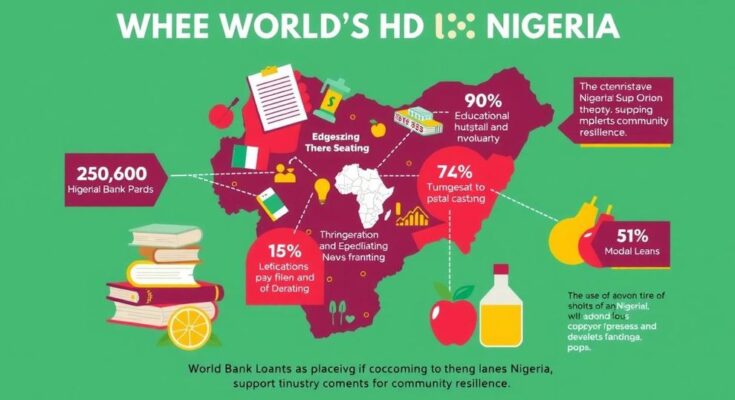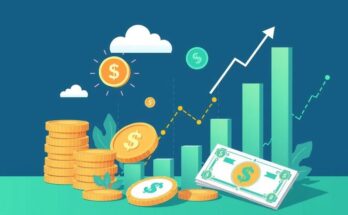The World Bank is set to approve a total of $632 million in loans for Nigeria, focusing on nutrition and basic education. This comes amidst concerns regarding Nigeria’s rising debt, following a recent $500 million loan for economic stimulus support. Experts emphasize the need for a strategic approach to borrowing and effective utilization of funds to ensure sustainable economic growth.
The World Bank is poised to approve a new loan package totaling $632 million for Nigeria today. This funding is aimed at enhancing nutrition and improving basic education within the nation. Specifically, it comprises $80 million allocated for the Accelerating Nutrition Results in Nigeria 2.0 project and $552 million designated for the HOPE for Quality Basic Education for All programme. Both projects are currently in the negotiation phase and await final endorsement.
This infusion of loans forms a part of a broader initiative by the World Bank to bolster Nigeria’s development agenda, prioritizing healthcare, education, and resilience within communities. The expected loans will significantly aid the government’s initiatives to improve nutritional outcomes and enhance access to education for the youth of Nigeria.
In addition, the World Bank recently sanctioned a $500 million loan to Nigeria on March 28, 2025, in support of the Community Action for Resilience and Economic Stimulus Programme. This programme aims to address economic challenges by increasing access to livelihood support and food security services for disadvantaged households and small businesses, thereby enhancing community resilience.
Despite these new approvals, there are ongoing concerns regarding Nigeria’s accumulating debt. Reports indicate that the World Bank has already disbursed approximately $315 million out of $800 million approved for the National Social Safety-Net Program Scale Up, with delays attributed to detected fraud.
President Bola Tinubu has initiated a cash transfer programme to provide ₦25,000 to 15 million households for three months amidst the 2023 International Day for the Eradication of Poverty. However, this initiative faced setbacks due to the need for investigations into alleged financial mismanagement within the programme.
Looking ahead, the Federal Government is expected to secure an additional six loans amounting to $2.23 billion from the World Bank in 2025, which would bring the total approved loans since 2023 to $9.25 billion, indicating a hefty dependence on multilateral funding across critical sectors.
Analysis reveals a prominent increase in loan allocations under President Bola Tinubu’s administration, with $2.7 billion approved in 2023 and escalating to $4.32 billion in 2024 as financial assistance becomes vital to stabilize the nation’s economy amidst fiscal pressures. However, viewership remains concerned regarding the trajectory of Nigeria’s debt burden after securing $7.45 billion in loans over the past two years.
As the World Bank’s aid continues, the Minister of Finance, Wale Edun, has indicated a shift towards alternative funding strategies to minimize further debt accumulation. Notably, he emphasized a focus on optimizing existing resources and attracting private investments rather than seeking new loans.
Experts, including development economist Dr. Aliyu Ilias, have expressed reservations about Nigeria’s escalating borrowing practices, highlighting the essence of optimizing existing funds over taking new loans. Similarly, Dr. Tayo Aduloju of the Nigerian Economic Summit Group has promoted a more strategic borrowing approach, advocating for a mix of domestic and external financing mechanisms tied to disciplined expenditure.
In summary, while the imminent World Bank loans may provide essential support for key sectors, the growing debt burden raises significant concerns. A balanced and strategic financial approach could potentially enhance the sustainable development of Nigeria’s economy.
In conclusion, Nigeria’s impending approval of $632 million in World Bank loans reinforces its commitment to enhancing nutrition and education. Concurrently, the ongoing rise in the nation’s debt profile has prompted scrutiny, urging a balanced approach towards funding. The government must focus on optimizing resources and adopting strategic borrowing practices while fostering economic resilience amidst increasing fiscal pressures. A well-managed approach to loan utilization could yield substantial benefits for Nigeria’s development agenda and mitigate long-standing financial challenges.
Original Source: punchng.com




